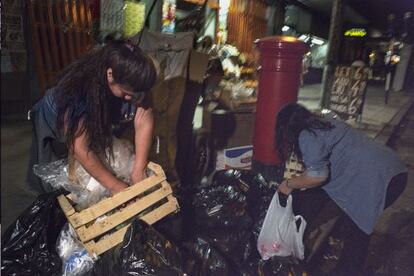Latin America’s bothersome garbage
Only half of the people in the region see their trash picked up on a daily basis


In some of the poorer neighborhoods on the outskirts of Buenos Aires, garbage trucks are supposed to pass by three times a week. But given that the streets are often impassable, as well as the fact that trash-collection companies do not comply with city contracts, this is often not the case.
So the garbage begins piling up on streets, blocking drain openings and putting people’s health at risk. Some neighbors end up burning their trash.
Sometimes water is sprayed onto some of the waste so that it can be used for livestock feed
Solid waste management has always been a major challenge for Latin America’s biggest cities.
Figures released in a recent Inter-American Development Bank (IDB) report show that about 45.4% of the people in the region benefit from daily trash collection services. Another 53% get their garbage picked up between two and five times a week, while 1.8% of Latin Americans only see the trash man once every seven days.
Yet the IDB report states that officials in Latin American cities give “high priority” to regular garbage pickup services, which can be found in 89.9% of the region.
The problem doesn’t just entail garbage collection but also how solid waste is finally disposed of. Around 45% of collected trash is not treated properly, according to the report.
In other words, half of Latin America’s garbage is either stored in municipal or open-pit landfills, or it is burned. Sometimes, water is sprayed on some of the refuse so that it can be used to feed livestock. Other inadequate handling of solid waste material has a negative impact on the environment, and consequently on health.
According to the IDB, only 19.8% of Latin American cities have solid waste management plans, and only 2.2% have formal recycling programs.
In many urban areas, garbage is picked up for recycling by the homeless and informal workers who eke out a living from the small amounts of cash they receive.
Nevertheless, the report states that garbage-collection services are more abundant in Latin America than in the Middle East and North Africa (85 percent), South Asia (65 percent) and Africa (45 percent).
Argentina, Chile, Colombia, Dominican Republic, Uruguay and Venezuela are the countries in the region where trash-pickup coverage is nearly 100 percent. In some of the poorer nations – El Salvador, Guatemala, Honduras and Paraguay – garbage collection services cover between 57% and 78.8%.
But daily pickups are not as frequent. Only 71.9% of Argentineans see their garbage collected once a day while in Mexico and Venezuela only 71.6% and 58.2% of their respective populations see the trash man on a daily basis.
In many urban areas, garbage is picked up for recycling by the homeless and informal workers
On the other hand, there are no daily services in Colombia, Costa Rica and Nicaragua, according to the IDB report.
In Brazil, 44.7% of the population have daily garbage pickups while in Chile only 22.3% have this benefit.
Recycling in Latin America is more infrequent than in other parts of the world. Guatemala (19.3%), Colombia (17.2%) and Peru (14.3%) have the highest numbers of formal government recycling plans while Costa Rica (0.3%) and Brazil (1%) are listed at the other end of the scale.
“Very few countries have a formal infrastructure to classify solid urban waste for recycling,” the IDB document stated. “In Latin America and the Caribbean, collection of recyclable materials is done primarily by the informal sector, through urban trash-pickers and recyclers, whose number are estimated to be about four million.”
Tu suscripción se está usando en otro dispositivo
¿Quieres añadir otro usuario a tu suscripción?
Si continúas leyendo en este dispositivo, no se podrá leer en el otro.
FlechaTu suscripción se está usando en otro dispositivo y solo puedes acceder a EL PAÍS desde un dispositivo a la vez.
Si quieres compartir tu cuenta, cambia tu suscripción a la modalidad Premium, así podrás añadir otro usuario. Cada uno accederá con su propia cuenta de email, lo que os permitirá personalizar vuestra experiencia en EL PAÍS.
¿Tienes una suscripción de empresa? Accede aquí para contratar más cuentas.
En el caso de no saber quién está usando tu cuenta, te recomendamos cambiar tu contraseña aquí.
Si decides continuar compartiendo tu cuenta, este mensaje se mostrará en tu dispositivo y en el de la otra persona que está usando tu cuenta de forma indefinida, afectando a tu experiencia de lectura. Puedes consultar aquí los términos y condiciones de la suscripción digital.








































